| Srl | Item |
| 1 |
ID:
065113


|
|
|
| 2 |
ID:
184985
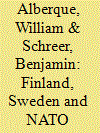

|
|
|
|
|
| Summary/Abstract |
Russia’s war against Ukraine has suddenly made NATO membership for Finland and Sweden highly likely. It would end their long-standing postures of ‘armed neutrality’. Their accession would constitute a major shift in European security. Properly managed, it could produce a net benefit. Both nations would be security providers, with highly capable forces. They would make significant contributions to burden-sharing among the allies and enhance NATO’s ability to modernise its defence planning and capability development. Their membership would also bolster NATO deterrence by complicating Russian military planning in the geostrategically evolving Baltic Sea region. Dealing with Russia in that region, the Arctic and the High North would also become more central to NATO’s strategy and posture.
|
|
|
|
|
|
|
|
|
|
|
|
|
|
|
|
| 3 |
ID:
182293
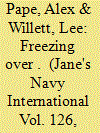

|
|
|
| 4 |
ID:
082691
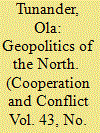

|
|
|
|
|
| Publication |
2008.
|
| Summary/Abstract |
After the Cold War, the Nordic states turned to the south, to the European Union. They established borderland regions to handle practicalities and relax the tension between east and west. Now, the Nordic states were free from Cold War bloc politics. The Nordic foreign policy elite amalgamated with Nordic constructivist scholars to reshape the political landscape of the North by re-inventing the pre-nation-state regional ties. However, the Nordic states also came to adapt to a new geometry of power, the Kjellénean power triangle. This return to Kjellénean geopolitics was not based on the power politics of the `US victory school', but, paradoxically enough, on European and Scandinavian relative weakness: a Geopolitik of the weak. Even more paradoxical, this return to geopolitics took place in Norway, Finland and to some extent in Denmark, not in Kjellén's home country of Sweden, i.e. as if the Swedish geopolitical taboo still made this impossible
|
|
|
|
|
|
|
|
|
|
|
|
|
|
|
|
| 5 |
ID:
162957
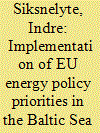

|
|
|
|
|
| Summary/Abstract |
The European Union (EU) has set ambitious goals for climate change and energy in its pursued policies (20% of renewable energy until 2020, 27% until 2030, and the aim to become the global leader in energy produced by renewable energy sources). Even more ambitious goals are established in the strategy of Energy 2050. Today European energy policy is oriented towards energy security, expansion of energy markets, energy efficiency, decarbonisation, and scientific research and innovations. The broader aim of this policy is a radical shift away from the current energy system to introduce a new system which would ensure environmental consistency, affordability of consumer prices, and security of supply. The paper analyses the trends of energy development across the eight Baltic Sea Region (BSR) countries. The analysis covers the period of 2008–2015. The main aim of the paper is to compare BSR countries achievements in sustainable energy development. The aggregate measures of energy sustainability are devised utilising multi-criteria decision-making (MCDM) MULTIMOORA (Multi-Objective Optimization on the basis of Ratio Analysis) technique. The paper presents an original framework for sustainable energy development indicators.
|
|
|
|
|
|
|
|
|
|
|
|
|
|
|
|
| 6 |
ID:
179759


|
|
|
|
|
| Summary/Abstract |
Since the turn of the century, memories of the Second World War are undergoing institutionalization in all states of the Baltic Sea region. Official narratives promoted by the state often lose touch with grassroots memories, which results in a growing fragmentation of the memory domain and threatens national unity. Fragmentation can only be overcome by allowing for wider margins of debate, rather than additional regulation.
|
|
|
|
|
|
|
|
|
|
|
|
|
|
|
|
| 7 |
ID:
100149
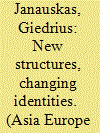

|
|
|
|
|
| Publication |
2010.
|
| Summary/Abstract |
The accession of Estonia, Latvia, Lithuania, Poland to the European Union (EU) has led to an increase in initiatives on Baltic Sea issues and a degree of enhanced confidence in moving towards solutions. While EU policies and instruments, and the provision of significant financial resources, have increased, one might still ask whether people across the Baltic Sea region are ready for the changes implied by the new Baltic strategy and comparable initiatives. Marko Lehti and David Smith have "tried to show that national thinking is by no means self-evident and that the Baltic can be comprehended as a trans-national space". Yet, how this position is articulated in the various societies warrants close investigation. This position is closely related to dominant identities and images within Baltic societies. How will the EU's innovative strategy and the resulting change of images impact upon the conceptual understandings of the Baltic Sea and region, including perhaps the search for a common identity as a successful and a pilot scheme?
|
|
|
|
|
|
|
|
|
|
|
|
|
|
|
|
| 8 |
ID:
142308


|
|
|
|
|
| Summary/Abstract |
The new US maritime strategy has received praise from many corners of the world. As a manual it is well suited to guide the efforts of its three sea services in navigating a challenging global security environment in the years ahead. The strategy emphasises maritime presence, both where conflict threatens the global system and US national interests, and where allies require reassurance, particularly in the Indo-Pacific region. However, Stefan Lundqvist and J J Widen argue that the document fails, to some extent, to address Russia's increasingly challenging conduct and its implications for Northeast Europe and the Baltic Sea region.
|
|
|
|
|
|
|
|
|
|
|
|
|
|
|
|
| 9 |
ID:
008678


|
|
|
|
|
| Publication |
1995.
|
| Description |
24-31
|
|
|
|
|
|
|
|
|
|
|
|
|
|
|
|
| 10 |
ID:
054385
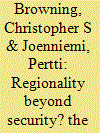

|
|
|
| 11 |
ID:
140886


|
|
|
|
|
| Summary/Abstract |
Recent geopolitical changes and the strengthening of the security/economy nexus have multiplied the types and functions of territorial borders in the Baltic Sea Region (BSR). These borders have been insufficiently addressed in previous research even though macro-regions cross over multiple borders, which are highly affected by geopolitical events and conflicts. This paper contributes to the debate about multiple borders with particular emphasis on the question how de- and re-bordering affect the regionalisation process in practice and how it influences the cooperation within the BSR. The results, which are based on a discourse analysis of a corpus of documents, show that the region-building process in the BSR itself creates new borders, which define the level of the member state’s political participation in the region. The governance of macro-regions would benefit from the development of such analytical frameworks that take into account the impact of the multitude of borders on the practical level.
|
|
|
|
|
|
|
|
|
|
|
|
|
|
|
|
| 12 |
ID:
054389
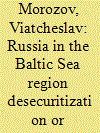

|
|
|